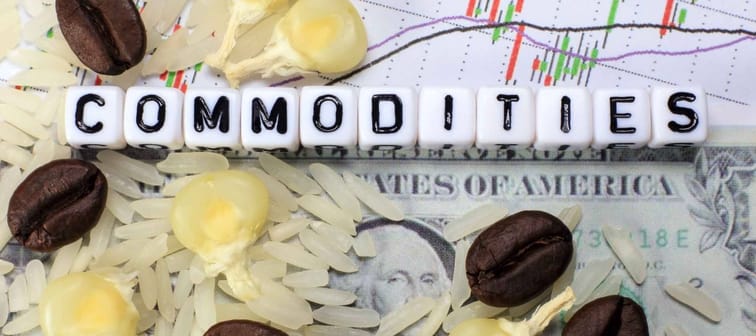Understand what commodities are
Like stocks and bonds, commodities are an asset class used in investing. Where stocks give you a piece of a company and bonds are a form of debt, investing in commodities gives you market exposure to real-world assets like oil, gold, corn, and pork bellies.
Commodity types
Commodity investing is commonly broken down into these four main categories:
- Agriculture: Agriculture includes crops grown around the world like corn, soybeans, wheat, rice, barley, cocoa, coffee, cotton, and sugar.
- Energy: Crude oil, natural gas, and similar products make up the energy category.
- Livestock: Cattle, hogs, and meat products like pork bellies.
- Metals: This category contains gold, silver, copper, platinum, and other mined metals.
Some of these investments are quite common, like investing in gold. But many are less common for regular investors. Keep in mind that you don't physically take possession of these commodities. They generally just live in your portfolio in paper form.
Some commodity investments track the price of a specific good. They can be very granular — focusing on a particular region or type of oil, for example — or more general. Below is a chart for a specific kind of energy commodity, Brent crude oil, one of the most common types of oil used to track oil commodity prices in the world.

Brent crude oil commodity price history via Business Insider
Because there are always markets open somewhere in the world, commodity prices can change 24 hours a day, though some of the biggest markets are located in the United States and follow roughly the same trading hours as the U.S. stock market. These include the Chicago Mercantile Exchange (CME), Chicago Board of Trade (CBOT), and New York Mercantile Exchange (NYMEX). These three exchanges are all owned and operated by the Chicago-based CME Group.
The world of commodities is subject to many market and economic forces, however, so they are often considered one of the riskiest ways to invest.
Meet Your Retirement Goals Effortlessly
The road to retirement may seem long, but with WiserAdvisor, you can find a trusted partner to guide you every step of the way
WiserAdvisor matches you with vetted financial advisors that offer personalized advice to help you to make the right choices, invest wisely, and secure the retirement you've always dreamed of. Start planning early, and get your retirement mapped out today.
Get StartedChoose the right type of commodity to buy (and the right broker)
You can invest in commodities through a brokerage account at many popular brokerages. Some firms focus on active trading and make a wonderful home for commodity accounts. But most full-service brokerage firms make it possible to invest in commodities through funds even if other options are not available.
You probably won't be heading to a farm, mine, or drilling rig to buy commodities on your own. Here are the methods most people use to buy and sell them in the markets:
- Mutual funds: Like ETFs, with mutual funds, you can own commodities as any underlying asset without going into the futures or options markets yourself. These are best for long-term commodity investments. Brokerage firm Ally Invest offers mutual funds, along with nearly every other asset class you can think of.
- Futures: With futures trading, you own an asset without taking control. Most contracts work similarly to options, where you have a right to exercise a contract on a specific date in the future. If the value is higher than what you paid, you make money. If it has fallen since you bought it, you lose money when selling your position. You can invest in futures using a stock broker like E*TRADE.
- Options: Commodity options work like a hybrid of stock options and commodity futures. These instruments allow you to buy (through a call) or sell (through a put) a specific quantity of a commodity at a future date at a specific price. Unlike futures, options typically put a limit on risk. Options trading also usually cost more than other types of investing options. Merrill Edge is a discount broker that offers options trading for only $0.65 a contract.
- ETFs: Over 100 different exchange-traded funds (ETFs) allow you to invest in instruments that follow the price of underlying commodities. You can buy and sell them like a stock. For example, the SPDR Gold Trust ETF (GLD) follows the price of gold. An ETF can own one commodity or a basket of different commodities for more diversification. This may be the easiest way for most people to invest in commodities. Public.com is a stock broker that has no commission fees on its ETF trading.
Understand the risks of investing in commodities
My college friend once shared the story of a family friend in Chicago who worked on one of the commodities exchanges. The friend would sometimes call and ask if he could come to dinner with my friend because he was flat broke. After a good trade, however, he would invite the whole family out for a steak and lobster dinner. Commodities are a boom-and-bust market that can be a massive risk for your finances.
Types of risk
It doesn't take too much time searching online to find stories of people losing their entire life savings to a market whim. Here are a few of the risks from investing in a commodity:
- Market factors: If coffee becomes more trendy, the demand for coffee rises, driving up the price.
- Environmental factors: An early freeze in Florida could kill orange trees or destroy part of the crop, which causes a shortage and drives up the price.
- Fear: Fear of a recession drives up the price of gold, while good economic news can drive the price down.
- Government action: A government can nationalize (take control of) a mine or other source of a commodity, which can cause either a drop or rise in the price of a commodity.
- Leverage and margin: With people putting down just a small portion of a contract price when betting on future commodity prices, a small investment can have outsized results, either positive or negative.
There's a lot to watch out for with each commodity.
According to value-investing legend Benjamin Graham, the behavior of commodities means they are not a true “investment” at all. Buying a commodity is trading, which is inherently risky.
If you think commodities make sense for your financial goals, take extreme caution, and start slowly. It's easy to make costly mistakes when you don't completely understand the mechanics involved.
Stop overpaying for home insurance
Home insurance is an essential expense – one that can often be pricey. You can lower your monthly recurring expenses by finding a more economical alternative for home insurance.
SmartFinancial can help you do just that. SmartFinancial’s online marketplace of vetted home insurance providers allows you to quickly shop around for rates from the country’s top insurance companies, and ensure you’re paying the lowest price possible for your home insurance.
Explore better ratesAdvantages of investing in commodities
While there are certainly a lot of risks involved in investing in commodities, there can be some advantages.
- Diversification: Commodity investing gives your portfolio exposure to an asset class other than stocks. This can help you manage overall stock market volatility, although it does not guarantee a profit.
- Potential for high returns: Commodities fluctuate often, which also means they have the potential for higher returns. Rising demand for products could have a positive impact on your portfolio. However, with great returns comes great risk. While there might be demand for oil and metals today, tomorrow might be different.
- Hedging against inflation: Inflation can really eat into your investments. Historically, commodities tend to be higher during times of strong inflation. If you buy commodities before inflation hits, it could help you hedge against inflation losses from other investments.
Be cautious
It's easy to buy and sell commodities in your portfolio, but as you learned above, it can be precarious. Commodities trading should be done only by people who understand the risks and are willing to lose all or some of their investment.
If you make a small mistake, it could cost you the entire position. You could also be blindsided by market news or government action that causes a huge price swing in an instant.
Commodities can be a path to rags or riches. If you go into the Wild West of the commodity markets, do so with extreme caution.
Sponsored
Follow These Steps if you Want to Retire Early
Secure your financial future with a tailored plan to maximize investments, navigate taxes, and retire comfortably.
Zoe Financial is an online platform that can match you with a network of vetted fiduciary advisors who are evaluated based on their credentials, education, experience, and pricing. The best part? - there is no fee to find an advisor.











